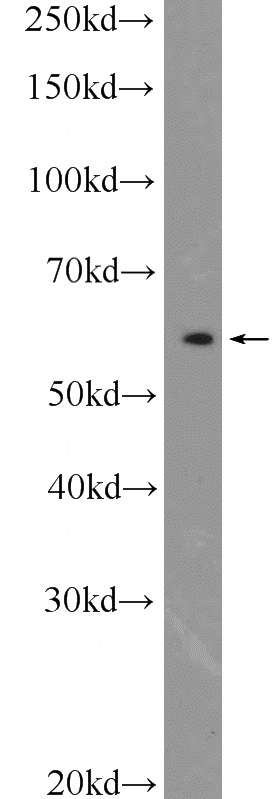-
Product Name
PSMC1 antibody
- Documents
-
Description
PSMC1 Rabbit Polyclonal antibody. Positive WB detected in mouse brain tissue, A549 cells, HeLa cells, Jurkat cells, mouse lung tissue. Observed molecular weight by Western-blot: 52-57 kDa
-
Tested applications
ELISA, WB
-
Species reactivity
Human,Mouse,Rat; other species not tested.
-
Alternative names
P26S4 antibody; p56 antibody; PSMC1 antibody
-
Isotype
Rabbit IgG
-
Preparation
This antibody was obtained by immunization of PSMC1 recombinant protein (Accession Number: NM_002802). Purification method: Antigen affinity purified.
-
Clonality
Polyclonal
-
Formulation
PBS with 0.1% sodium azide and 50% glycerol pH 7.3.
-
Storage instructions
Store at -20℃. DO NOT ALIQUOT
-
Applications
Recommended Dilution:
WB: 1:500-1:5000
-
Validations

mouse brain tissue were subjected to SDS PAGE followed by western blot with Catalog No:114388(PSMC1 Antibody) at dilution of 1:1000
-
Background
PSMC1(26S protease regulatory subunit 4) is also named as p26s4 and belongs to the AAA ATPase family.The 26S protease is involved in the ATP-dependent degradation of ubiquitinated proteins. The regulatory (or ATPase) complex confers ATP dependency and substrate specificity to the 26S complex.
-
References
- Watabe K, Akiyama K, Kawakami E. Adenoviral expression of TDP-43 and FUS genes and shRNAs for protein degradation pathways in rodent motoneurons in vitro and in vivo. Neuropathology : official journal of the Japanese Society of Neuropathology. 34(1):83-98. 2014.
- Sparks A, Dayal S, Das J, Robertson P, Menendez S, Saville MK. The degradation of p53 and its major E3 ligase Mdm2 is differentially dependent on the proteasomal ubiquitin receptor S5a. Oncogene. 33(38):4685-96. 2014.
Related Products / Services
Please note: All products are "FOR RESEARCH USE ONLY AND ARE NOT INTENDED FOR DIAGNOSTIC OR THERAPEUTIC USE"
